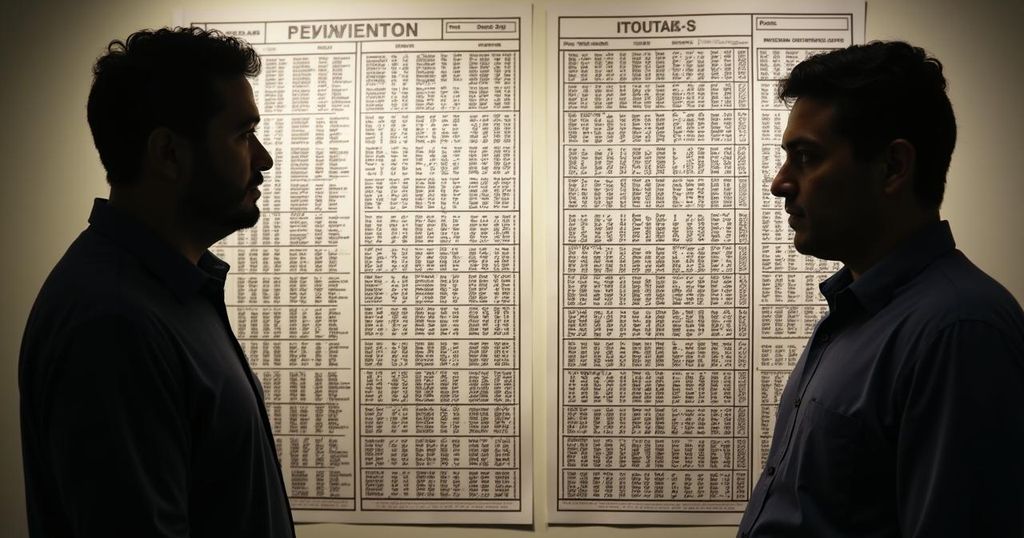Independent Election Experts Validate Venezuelan Opposition Tally Sheets Indicating Maduro’s Defeat

Independent election experts from the Carter Center have validated the tally sheets from Venezuela’s opposition, asserting that these documents indicate President Nicolás Maduro’s defeat. During an OAS session, experts stated that the electronic voting system was effective, contradicting claims made by the ruling party that alleged hacking prevented the release of detailed results. The opposition has maintained that they obtained tally sheets from 80% of voting machines, while the government has accused them of fraud. Calls for transparency in Venezuelan elections continue from multiple nations.
An independent group of election experts has affirmed the legitimacy of tally sheets presented by the Venezuelan opposition, which contend that President Nicolás Maduro was defeated in the recent July presidential election. During a gathering convened by the Organization of American States (OAS) in Mexico City, representatives from the Carter Center, a U.S.-based observer entity, reported that the electronic voting system was functional and suggested that stakeholders were aware of the actual results. These statements were made amidst ongoing disputes regarding the election outcome, which was claimed by the ruling party to favor Maduro without substantial evidence. The conflict revolves around thousands of tally sheets, known locally as actas, which are crucial in confirming election results in Venezuela. Each electronic voting machine is designed to produce multiple copies of these sheets, which can be requested by representatives of the participating parties during the transmission of data to the National Electoral Council. While electoral authorities declared Maduro the victor shortly after polls closed, they did not disclose results broken down by machine, citing a website hack as the reason for this lack of transparency. In contrast, the opposition coalition has been able to obtain and publish tally sheets from over 80% of the voting machines online. Following this, the government characterized these sheets as fraudulent and initiated an investigation into opposition figures, including Edmundo González, the coalition’s candidate. Jennie Lincoln, leading the Carter Center’s observation mission, clarified the nature of the voting system, stating, “The voting system is electronic, but it offers a paper trail – proof of what the electronic machine reports – and that is what was collected by tens of thousands of poll watchers, not just from the opposition, but also from the government party, the PSUV, that also has the same information.” Lincoln refrained from declaring Gonzalez the winner, emphasizing that such decisions rest with electoral authorities. The OAS, along with several countries, has urged Venezuela’s electoral officials to provide detailed voting information to ensure transparency. This meeting was prompted by requests from nations including Argentina, Costa Rica, Panama, the United States, Guatemala, Guyana, Peru, the Dominican Republic, and Ecuador.
The ongoing political climate in Venezuela has resulted in significant scrutiny of the electoral process, particularly following the July 28 presidential election where President Nicolás Maduro’s victory is contested by opposition groups. Observers from independent organizations, like the Carter Center, have been engaged to evaluate the elections amidst allegations of electoral fraud and manipulation, a situation that has ramifications not only for Venezuelan politics but for regional stability in Latin America. The use of electronic voting in Venezuela adds a layer of complexity, as it relies on both technology and a physical paper trail for accountability in the electoral process. The validity of these processes is critical in determining the acceptance of election outcomes.
In conclusion, independent election experts have reinforced the opposition’s claims regarding the veracity of the tally sheets from Venezuela’s presidential election, suggesting that the electronic voting system functioned correctly. The assertions made by the Carter Center highlight the necessity of transparency in electoral practices, particularly in light of the ongoing disputes surrounding the legitimacy of Maduro’s declared victory. Discussions led by the Organization of American States emphasize the international call for clear and accessible election data from Venezuela’s electoral authorities to restore public confidence in the democratic process.
Original Source: apnews.com








